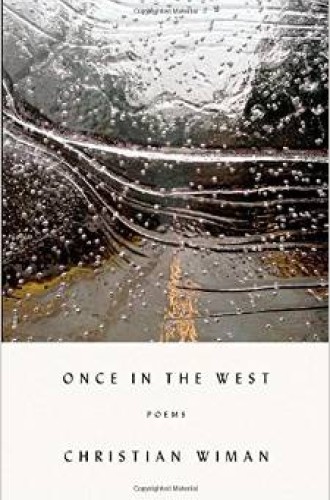Once in the West: Poems, by Christian Wiman
Christian Wiman, former editor of Poetry magazine and now lecturer in religion and literature at Yale Divinity School and the Yale Institute of Sacred Music, offers further evidence that his voice is among the most compelling in contemporary poetry. Like the writings in his prose collection My Bright Abyss: Meditation of a Modern Believer, these poems are filled with theological conundrums, unanswered questions, brutal answers to questions never formed, and above all, contradictions. Wiman holds belief and unbelief in a precarious balance that finally tips toward “Love’s reprieve.”
The collection begins with a prayer that readers “blurred / by anxiety / or despair / might find / here / a trace / of peace.” That peace, however, is hard won, and the reader is challenged on every page to untangle the web of binaries that characterize one man’s life and faith struggles. As Wiman so eloquently describes in My Bright Abyss, his perilous fight with serious and ongoing health issues have made him particularly aware of time passing.
Read our latest issue or browse back issues.
One finds no shred of sentimentality or nostalgia in the poems that describe his early life. He is instead blatantly honest as he remembers killing birds with a pellet gun. “I felt nothing, and I will not betray those days,” he writes, “if days are capable of being betrayed, / by pretending a pang in my larval heart.” He describes purposely driving a steamroller over a black snake. He claims “I mean to be mean” in describing the “drycleaned deacons” and the “anusless angels / divvying up the deviled eggs and jello salad” at his childhood church. He claims in this poem to “abandon / even the pretense of prayer,” but he ends the poem with the beginning of prayer: “Dear God—.”
He admits that some days are “veined with grace,” and in a poem in which a preacher speaks to seminarians, he notes “that rapt famished look that leaps / from person to person, year to year, like a holy flu”—this in the midst of the admission that “it’s a bitch existence some Sundays.”
Wiman’s observations about the church and those in it who profess Christ but “live more remote from love” have been familiar complaints since the time of Christ. But when a poet makes these charges, the primary emphasis seems to be on the insincerity and inadequacy of language, which is being used dishonestly. If a profession of belief rolls easily off the tongue and leans toward cliché, it is all patter and no substance. That is precisely why these poems are often difficult. Wiman strenuously resists the hackneyed religious platitude or even the convenient expression of doubt. Instead, he uses poetry to stretch language to contain what it cannot say. This is not easy for writer or reader.
In spite of the seriousness of the subject matter, however, these poems are filled with delightful language play, with coined words that are just about perfect, and lyrical flights that make the reader stop and pronounce them aloud. “Here it comes, brothers and sisters, the confession of sins, / hominy hominy, dipstick doxology, one more churchcurdled hymn / we don’t so much sing as haunt.”
As for the present, Wiman is living in the in-between, in the limbo of the uncertainties a serious illness presents to him—a state of being which is, in the familiar language of Advent, the “already not yet.” There is pain, and it can seem “hellfired . . . by some country Satan / who’d seasoned meat / with shattered glass.” But there is also Chicago’s Shedd Aquarium, which he visits with his wife and his two small children, where he watches the girls watching the tiny fish and realizes that “Something in us touches / suffering / touching / us.” The collection ends with the last line of this poem, as with his wife he watches a new world opening up for his children, a world “almost / too green / too blue / to stand / And I held your hand.”
Wiman is groping in the darkness toward a Christ who cries his own agony; he writes with the hope that he will not surrender to the “wonder / nothing means / Not to end / with a little flourish of earth.” Maybe, he suggests in the faintest whisper, which carries hints of the resurrection, the answer will be “not to end.”






